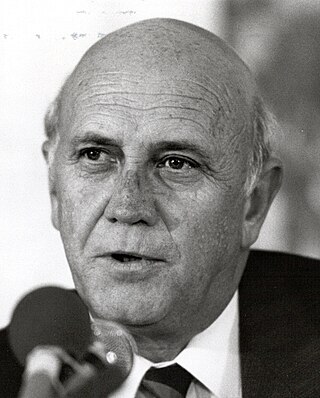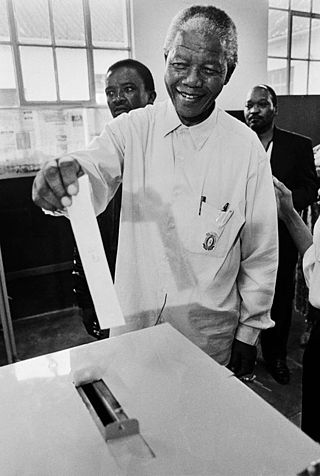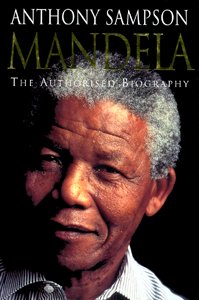
Frederik Willem de Klerk was a South African politician who served as state president of South Africa from 1989 to 1994 and as deputy president from 1994 to 1996. As South Africa's last head of state from the era of white-minority rule, he and his government dismantled the apartheid system and introduced universal suffrage. Ideologically a conservative and an economic liberal, he led the National Party (NP) from 1989 to 1997.
The Republic of South Africa is a unitary parliamentary democratic republic. The President of South Africa serves both as head of state and as head of government. The President is elected by the National Assembly and must retain the confidence of the Assembly in order to remain in office. South Africans also elect provincial legislatures which govern each of the country's nine provinces.

The Inkatha Freedom Party is a right-wing political party in South Africa. The party has been led by Velenkosini Hlabisa since the party's 2019 National General Conference. Mangosuthu Buthelezi founded the party in 1975 and led it until 2019. The IFP is currently the fourth largest party in the National Assembly of South Africa, in 2014 yielding third place to the Economic Freedom Fighters, formed in 2013. Although registered as a national party, it has had only minor electoral success outside its home province of KwaZulu-Natal.

General elections were held in South Africa between 26 and 29 April 1994. The elections were the first in which citizens of all races were allowed to take part, and were therefore also the first held with universal suffrage. The election was conducted under the direction of the Independent Electoral Commission (IEC), and marked the culmination of the four-year process that ended apartheid.

Prince Mangosuthu Gatsha Buthelezi is a South African politician and Zulu traditional leader who is currently a Member of Parliament and the traditional prime minister to the Zulu royal family. He was Chief Minister of the KwaZulu bantustan during apartheid and founded the Inkatha Freedom Party (IFP) in 1975. He also served as Minister of Home Affairs from 1994 to 2004.
1994 in South Africa saw the transition from South Africa's National Party government who had ruled the country since 1948 and had advocated the apartheid system for most of its history, to the African National Congress (ANC) who had been outlawed in South Africa since the 1950s for its opposition to apartheid. The ANC won a majority in the first multiracial election held under universal suffrage. Previously, only white people were allowed to vote. There were some incidents of violence in the Bantustans leading up to the elections as some leaders of the Bantusans opposed participation in the elections, while other citizens wanted to vote and become part of South Africa. There were also bombings aimed at both the African National Congress and the National Party and politically-motivated murders of leaders of the opposing ANC and Inkatha Freedom Party (IFP).
1990 in South Africa saw the official start of the process of ending Apartheid. President of South Africa, eid. President De Klerk unbanned organisations that were banned by the government including the African National Congress, the South African Communist Party and the Pan Africanist Congress. The African National Congress, Umkhonto we Sizwe, suspends its armed activity within South Africa. Political prisoners including Nelson Mandela were released. Nelson Mandela met ANC leader Oliver Tambo for the first time in 28 years at a meeting in Sweden. Mandela also traveled to England to thank the people for their support in the campaign to free him. South Africa withdrew its troops from Namibia, which was granted independence. 1990 also saw marches in support and against the formation of a new post-Apartheid South Africa.

Long Walk to Freedom is an autobiography credited to South African President Nelson Mandela. It was ghostwritten by Richard Stengel and first published in 1994 by Little Brown & Co. The book profiles his early life, coming of age, education and 27 years spent in prison. Under the apartheid government, Mandela was regarded as a terrorist and jailed on the infamous Robben Island for his role as a leader of the then-outlawed African National Congress (ANC) and its armed wing the Umkhonto We Sizwe. He later achieved international recognition for his leadership as president in rebuilding the country's once segregationist society. The last chapters of the book describe his political ascension and his belief that the struggle still continued against apartheid in South Africa.

A referendum on ending apartheid was held in South Africa on 17 March 1992. The referendum was limited to white South African voters, who were asked whether or not they supported the negotiated reforms begun by State President F. W. de Klerk two years earlier, in which he proposed to end the apartheid system that had been implemented since 1948. The result of the election was a large victory for the "yes" side, which ultimately resulted in apartheid being lifted. Universal suffrage was introduced two years later.

The apartheid system in South Africa was ended through a series of bilateral and multi-party negotiations between 1990 and 1993. The negotiations culminated in the passage of a new interim Constitution in 1993, a precursor to the Constitution of 1996; and in South Africa's first non-racial elections in 1994, won by the African National Congress (ANC) liberation movement.

Goodbye Bafana, or The Color of Freedom (US), is a 2007 drama film, directed by Bille August, about the relationship between Nelson Mandela and James Gregory, his censor officer and prison guard, based on Gregory's book Goodbye Bafana: Nelson Mandela, My Prisoner, My Friend. The film also explores the relationship of James Gregory and his wife as their life changes while Mandela is under Gregory's watch.
The Shell House massacre was a 1994 shooting incident that took place at Shell House, the headquarters of the African National Congress (ANC), in central Johannesburg, South Africa in the lead up to the 1994 elections.

South Africa since 1994 transitioned from the system of apartheid to one of majority rule. The election of 1994 resulted in a change in government with the African National Congress (ANC) coming to power. The ANC retained power after subsequent elections in 1999, 2004, 2009, 2014, and 2019. Children born during this period are known as the born-free generation, and those aged eighteen or older, were able to vote for the first time in 2014.
There is a wide range of ways in which people have represented apartheid in popular culture. During (1948–1994) and following the apartheid era in South Africa, apartheid has been referenced in many books, films, and other forms of art and literature.
James Gregory was the censor officer and prison guard of Nelson Mandela for many years of his captivity. He later wrote the book Goodbye Bafana: Nelson Mandela, My Prisoner, My Friend, on which the 2007 film Goodbye Bafana was based. The book, and later the film, are based on the idea that Gregory and Mandela had developed a friendship despite being prison guard and prisoner, respectively.

Nelson Rolihlahla Mandela was a South African anti-apartheid activist and politician who served as the first president of South Africa from 1994 to 1999. He was the country's first black head of state and the first elected in a fully representative democratic election. His government focused on dismantling the legacy of apartheid by fostering racial reconciliation. Ideologically an African nationalist and socialist, he served as the president of the African National Congress (ANC) party from 1991 to 1997.
Boipatong Vanderbijlpark is a township in Gauteng, South Africa. It was established in 1955 to house black residents who worked in Vanderbijlpark and Vereeniging.

On 2 February 1990, the State President of South Africa F. W. de Klerk delivered a speech at the opening of the 1990 session of the Parliament of South Africa in Cape Town in which he announced sweeping reforms that marked the beginning of the negotiated transition from apartheid to constitutional democracy. The reforms promised in the speech included the unbanning of the African National Congress (ANC) and other anti-apartheid organisations, the release of political prisoners including Nelson Mandela, the end of the state of emergency, and a moratorium on the death penalty.

Nelson Mandela took the oath as President of South Africa on 10 May 1994 and announced a Government of National Unity on 11 May 1994. The cabinet included members of Mandela's African National Congress, the National Party and Inkatha Freedom Party, as it was required under the terms of the Clause 88 of the Interim Constitution of South Africa that all parties winning more than 20 seats in National Assembly be given representation in the cabinet.
Lionel Mtshali was a South African politician who was Premier of KwaZulu-Natal from 1999 to 2004. He was known for unilaterally ordering the expansion of the province's antiretrovirals programme during the HIV/AIDS epidemic, in defiance of the policy of the national government under President Thabo Mbeki. A founding member and former chairperson of the Inkatha Freedom Party, Mtshali was also national Minister of Arts, Culture, Science and Technology in the government of President Nelson Mandela from 1996 to 1999.











